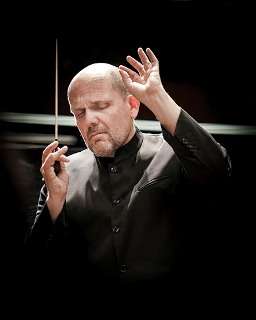|
Back
Our Time Has Come! New York
David Geffen Hall, Lincoln Center
09/27/2018 - & September 28*, 2018
Conrad Tao: Everything Must Go (World Premiere)
Anton Bruckner: Symphony No. 8 in C minor
New York Philharmonic, Jaap van Zweden (conductor)

J. van Zweden (© Hans van der Woerd)
“...the background of all his music-making is piety and a mystic sense of union with God such as can otherwise be found, in the whole range of European music, only in Bach.”
Eugen Jochum
“Our time will come!”
Gustav Mahler, referring to himself as well as to his teacher Anton Bruckner
Only an organist could have written the Eighth Symphony of Anton Bruckner. The genius at the multiple keyboard is heard in every bar of the third and fourth movements, a sublime combination of mastery and piety. Those who were fortunate enough to attend the composer at the organ interweaving passages from this amazing symphony with motifs and themes from Wagner’s Ring operas never forgot the experience.
The Eighth holds a rather embarrassing place in the lore of the Philharmonic. When Mariss Jansons and Lorin Maazel were the two finalists to lead the orchestra after the fall of Kurt Masur, the pair was given the assignment of preparing this amazingly profound and deceptively simple symphony. Jansons worked hard at his rehearsals whereas Maazel conducted one run-through of the piece and then announced that the players knew it well enough, thus confirming Allan Kozinn, who observed at the time in the New York Times, “critics have described his performances as flashy, calculated and superficial.” Maazel got the job and led the Bruckner at one of his first concerts. I was there. It stunk!
Certainly (well, hopefully) this will not be the case with Jaap van Zweden. Having inherited a much more polished and disciplined ensemble thanks to the efforts of Alan Gilbert – a fine orchestra builder but a rather weak presenter – the new maestro has thus far proven himself a disciplined and expressive conductor.
So imagine my surprise at the sloppiness of this performance. Last week in The New Criterion, Jay Nordlinger described the first concert of the year mounted by maestro and his Philharmonic – I was not there, having little interest in yet another night of The Rite of Spring. Jay mentioned that the evening began with an oomp – an obligatory opening modern piece – which seems to be de rigueur at modern New York performances. The work – by Conrad Tao – was gotten through with little fanfare and ended quietly, melting seamlessly into the first notes of the Bruckner. When we finally reached the conclusion of Bruckner’s Allegro moderato the ensemble stopped playing. At this point the crowd erupted in applause as if we had finally reached the end of the Tao composition! Many in the audience could not submerge the urge to laugh, as the crowd had clearly thought that this was the conclusion of the first piece on the program. This jollity viciously undercut the seriousness of the Bruckner and even Mr. van Zweden laughed. The performance was doomed at that moment.
There are so many editions of this piece that almost any that one hears seems a little foreign, a tad off the mark. Here, in the Nowak edition of 1955, there were many little passages that seemed wrong. For example, the stage was graced with three harps and yet they were hardly ever utilized, certainly not for solo passages or even unadorned chords. The visual of the three gigantic instruments and their lack of sound, especially in key moments of the last movement, was disconcerting, but this is the realpolitik of the Brucknerian scholar.
Overall, the playing was fair, but the individual passages were often found lacking in inspiration. The work is so great that one can always concentrate on any individual passage and sing its praises, but we would expect more from our flagship orchestra and its new, highly recommended and ultra-hyped leader. Positioning the celli up front stage left was a move in the right direction, accomplishing through the sheer physics of sound what was lacking in true inspiration from the podium. To paraphrase Bruno Walter, Maestro van Zweden made the beautiful tragic, but not the tragic beautiful.
This concert ushers in my 21st season of reviewing music in New York, leaving my work as a music essayist and radio host to younger (and perhaps more energetic) critics. It’s been a great ride so far. My personal top ten:
10. Ewa Podles solo recital
9. Alan Gilbert leads A Survivor From Warsaw
8. Hélène Grimaud as soloist in Rachmaninoff Concerto No. 2
7. Vladimir Feltsman solo recital
6. Conversation with György Sándor
5. Anne Sofie von Otter Korngold concert
4. Rostropovich conducts Prokofiev Romeo and Juliet
3. Levine’s Wozzeck
2. Dmitri Hvorostovsky as Rodrigo in Don Carlo
1. Zoltán Kocsis solo recital
Fred Kirshnit
|